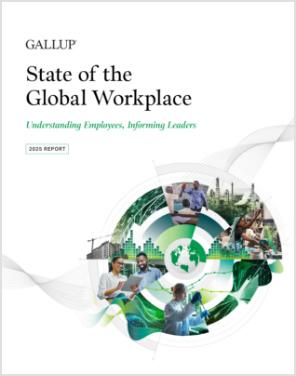Globally, one in five employees report experiencing loneliness a lot the previous day according to Gallup’s new State of the Global Workplace: 2024 Report.
Loneliness is more prevalent among employees younger than age 35 than it is for those aged 35 and older. The same percentages of working men and working women report loneliness: each 20%. Job levels also seemed to have little association with loneliness.
Of all the variables Gallup analyzed, work location shows the biggest differences in employees’ experiences with loneliness. Fully remote employees report significantly higher levels of loneliness (25%) than do those who work exclusively on-site (16%) -- hybrid workers fall in between at 21%.
Why Loneliness Matters
Social isolation and chronic loneliness have devastating effects on physical and mental health. Harvard Professor and Gallup Senior Scientist Lisa Berkman and her colleagues studied the relationship between social and community ties and mortality rates over a nine-year span. The risk of mortality among people who lacked community and social ties was two times greater than that of people who had many social contacts. These differences were independent of physical health, socioeconomic status and health practices.
Other studies have found similar relationships between strong social connections and longevity.
How Employers Can Help
The good news is that work itself decreases loneliness. In general, working adults are less likely to experience loneliness (20%) than those who are unemployed (32%), and this remains true across age groups.
This positive effect is much stronger, however, as employee engagement rises. If employees are actively disengaged, they are almost as likely to be lonely as those who are unemployed. If employees are engaged -- if they find their work meaningful and feel connected to their team members and organization -- their likelihood of loneliness is substantially lower.
In a separate U.S. study, engaged employees were 64% less likely to be lonely than those who are not engaged. Overall engagement has a much stronger effect than any of the 12 individual aspects of engagement that Gallup has studied. For example, employees who say their opinion counts are 39% less likely to be lonely, and those who get to do what they do best every day are 37% less likely to be lonely.
Surprisingly, having a best friend at work is among the lowest of the 12 items when it comes to reducing loneliness. Employees who say they have a best friend at work are 21% less likely to be lonely. That is still meaningful, but not as significant as engagement overall.
Why might this be so? It’s possible that meaningful work absorbs people’s attention to a degree that they don’t feel loneliness -- they are simply too occupied doing something that interests them.
If leaders want to address their employees’ loneliness, the best option may be to pursue employee engagement holistically.
To learn more about Gallup workplace science and the latest trends in the global workforce, including engagement data in your own country, download the State of the Global Workplace report now.





